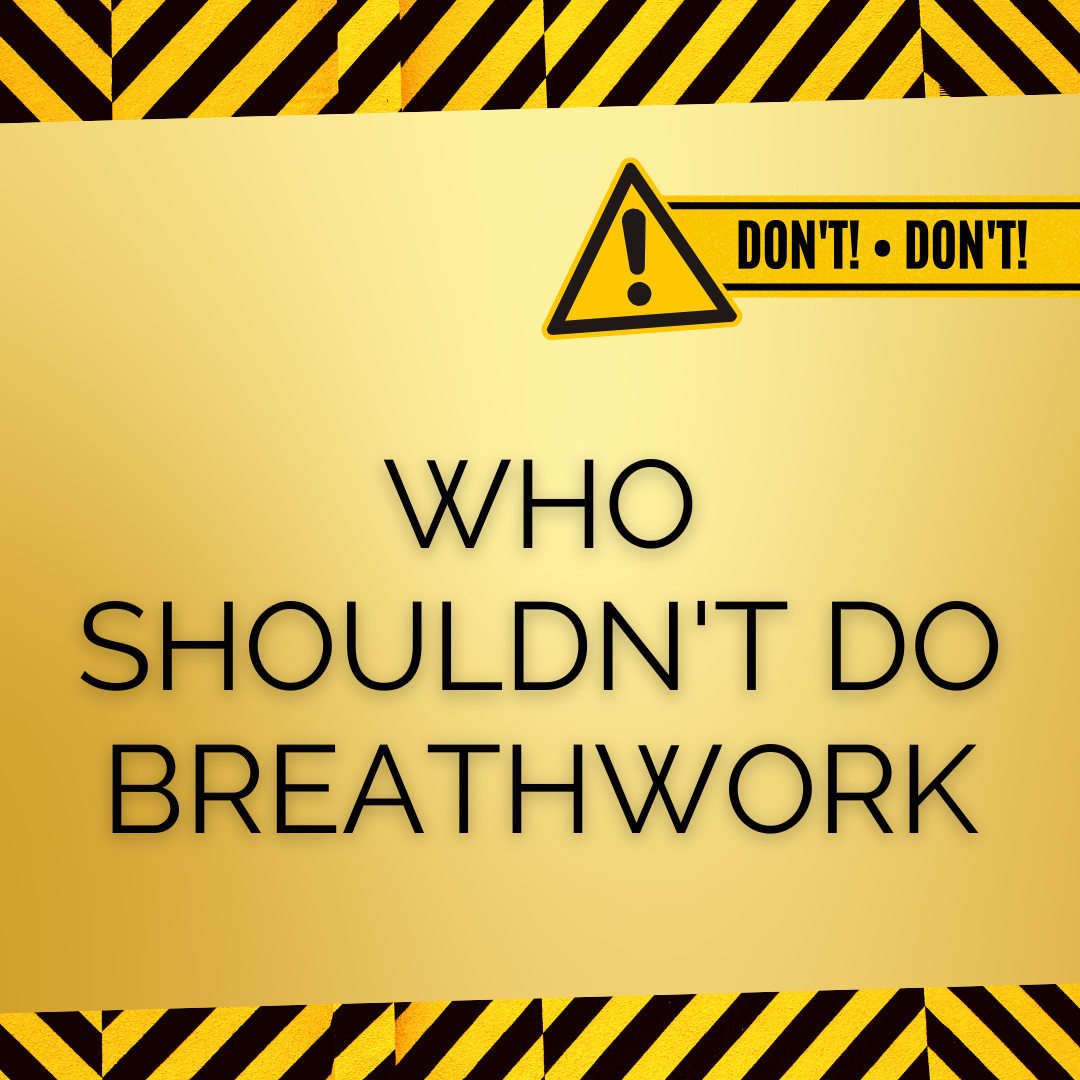
Who shouldn't do Breathwork?
Posted On January 25, 2023
Breathwork is a holistic practice that has been gaining popularity in recent years as a tool for improving physical and mental well-being. This ancient practice, which involves controlled breathing exercises, has been used for centuries in various cultures and traditions as a way to connect the body and mind. However, while it can be beneficial for many people, not all types of breathwork are suitable for everyone. In this blog, we will explore who should be cautious when practicing breathwork and why.
[1] Often the term “breathwork” is used to describe “modern day breathwork,” which is usually a type of breathing that is done for an hour that is designed to upregulate the nervous system in a safe way. Whereas “breathing exercises” are used to describe breathing exercises done in a certain way (usually counting the duration of the inhale and the exhale) for 1-5 mins.
This article is meant to share who should not be practicing state-altering breathwork (including but not limited to holotropic breathwork, circular connected breathwork, and three-part breathwork).
Those with the following should not practice state-altering breathwork:
-
History of seizures or epilepsy
-
Those Currently Pregnant
-
Serious eye issues (Including detached retina & glaucoma)
-
High blood pressure that is not controlled with medication
-
Major heart conditions (Including cardiovascular disease or history of heart attack)
-
Hospitalization for any psychiatric or emotional reasons within the last 10 years
-
Serious neurological conditions (Including, history of aneurysms or strokes)
-
Bipolar or schizophrenia
-
Osteoporosis (Tremors or movement can happen and we don’t want to risk cause physical issues
-
Those with asthma should breath slower and have their inhaler with them
One group of individuals who should be cautious when practicing breathwork are those with respiratory conditions such as asthma or chronic obstructive pulmonary disease (COPD). These conditions can be exacerbated by certain breathing techniques, such as those that involve holding the breath or breathing rapidly. So, if you have a respiratory condition, it's important to consult with your doctor before starting a breathwork practice.
[1] Pregnant women should also be careful when practicing breathwork. Certain breathing techniques can increase the oxygen supply to the fetus, which can be beneficial for both the mother and the baby. However, other techniques may not be safe and could cause problems during pregnancy. If you're pregnant, it's best to consult with your obstetrician before trying any new breathing exercises. If you are pregnant, it’s best to avoid state-altering breathwork including holotropic breathwork, circular connected breath, and three-part breath.
[1] Another group of people who should exercise caution when practicing breathwork are those with a history of psychological disorders, including bipolar and schizophrenia. This is because certain upregulating breathing techniques can cause feelings of anxiety or panic–it’s not common, but it can happen with those who are already prone to these disorders. It's like trying to put out a fire with gasoline, instead of water. You might make the situation worse. Box breathing is a suitable practice for resetting the nervous system and support those with psychological disorders tremendously.
[2] Furthermore, those in active addiction or recent trauma should avoid breathwork for their sensitive conditions, as it might trigger them. For these populations, it’s important to only practice breathwork with trained practitioners. It’s recommended to start off what breathing practices done in through the nose and are designed to down-regulate the nervous system.
[1] Finally, individuals who are currently experiencing extreme emotional distress or are in the middle of a medical emergency should not participate in breathwork without first seeking professional help. Breathwork can be an effective tool for managing stress and anxiety, but it should not be used as a substitute for professional medical or psychological treatment.
In conclusion, breathwork can be a powerful tool for improving physical and mental well-being. However, certain individuals should be cautious when participating in this practice, including those with respiratory conditions, pregnant women, individuals with a history of psychological disorders, those in active addiction or trauma, and those experiencing extreme emotional distress or medical emergencies. As with any practice, it's always best to consult with a medical or mental health professional before starting a breathwork practice.
Resources Links:
[1] Is Breathwork Safe? 10 Common Side Effects You May Experience. (n.d.). https://www.othership.us/resources/breathwork-side-effects
[2] Cronkleton, E. (2019, April 29). What is Breathwork? Healthline. https://www.healthline.com/health/breathwork
[3] Is the Way You Breathe Making You Anxious? (n.d.). Greater Good. https://greatergood.berkeley.edu/article/item/is_the_way_you_breathe_making_you_anxious
[4] Seppälä, E. M. (2020b, July 15). Promoting Mental Health and Psychological Thriving in University Students: A Randomized Controlled Trial of Three Well-Being Interventions. Frontiers. https://www.frontiersin.org/articles/10.3389/fpsyt.2020.00590/full?
Recent Post
-
24 January 2023
-
26 January 2023
-
27 January 2023

Join Us for a Free Sunday Breathwork Class
Fill out the form below to join our community!
© 2020-2024 Breath of Gold. All Rights Reserved.



